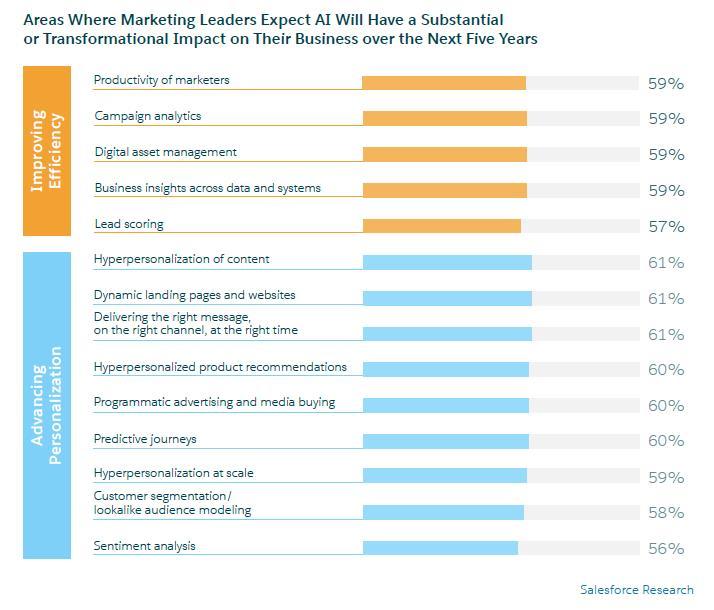Here’s a Forbes headline that caught our attention recently: 53% of Marketers Plan To Adopt Artificial Intelligence In Two Years
Sounds great, right – but what does it mean? The number comes from the Salesforce Fourth Annual State of Marketing report, subtitled “Marketing Embraces the AI Revolution.” And yes, even the researchers noted that the percentage sounds high – and they do, if you are thinking of AI as, perhaps, nearly sentient. The numbers make more sense, however, when you consider the actual functionality encompassed in the “AI” term:

The “AI” tasks fall in two major categories – efficiency and personalization.
In the efficiency category, we wouldn’t be surprised to see many marketers using some of these tools in the next two years. It make sense that everyone would want automated tools that improve their productivity, especially in the areas called out. Who hasn’t been frustrated when pulling campaign metrics, searching for the right digital assets or trying to align data from multiple systems? The last efficiency item mentioned is lead scoring, and those of us who are using marketing automation systems may very well feel we’re already using AI of a sort to triage our leads. In the next two years, machine learning will probably make these lead scoring tools even more powerful, as they “learn” to weight what matters with less need for input from the marketing and sales teams.
Under personalization, we see a number of tasks that have, again, already been touched by marketing automation tools and some advanced CMS platforms. What it all comes down to: delivering the right content, to the right person, on the right channel, at the right time. These concepts will all fuse together. Predictive journeys? Critical to nurturing that B2B buyer. Sentiment analysis? Good call, don’t send that up-selling email or show that ad if they’re Tweeting about how awful your product is. Martech has been touching on a lot of this for the last half-decade, but it’s the AI and machine learning factor that should unify it and make it that much better.
In short, AI is rapidly finding its way into martech and has the potential to improve every aspect of marketing automation and personalization, so martech adoption is AI adoption. (If your marketing automation platform can’t articulate their AI and machine learning strategies, you may want to find a different marketing automation platform.) In this context, does 53% still sound high? Probably not.